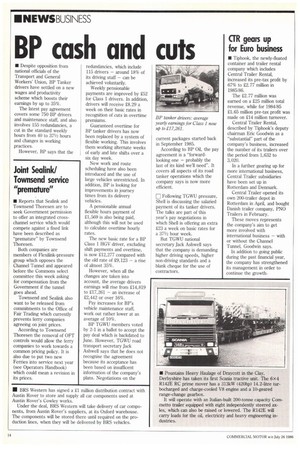BP cash and cuts
Page 16

If you've noticed an error in this article please click here to report it so we can fix it.
• Despite opposition from national officials of the Transport and General Workers' Union, BP Tanker drivers have settled on a new wages and productivity scheme which boosts their earnings by up to 35%.
The latest pay agreement covers some 750 BP drivers and maintenance staff, and also involves 155 redundancies, a cut in the standard weekly hours from 40 to 371/2 hours and changes in working practices.
However, BP says that the redundancies, which include 115 drivers — around 18% of its driving staff — can be achieved voluntarily.
Weekly pensionable payments are improved by £52 for Class 1 drivers. In addition, drivers will receive £8.29 a week on their basic rates in recognition of cuts in overtime premiums.
Guaranteed overtime for BP tanker drivers has now been replaced by a system of flexible working. This involves them working alternate weeks of early and late shifts over a six day week.
New work and route scheduling have also been introduced and the use of large vehicles unrestricted. In addition, BP is looking for improvements in journey times from its delivery vehicles.
A pensionable annual flexible hours payment of £1,569 is also being paid, although this will not be used to calculate overtime hourly rates.
The new basic rate for a BP Class 1 HGV driver, excluding shift payments and overtime, is now 212,277 compared with the old rate of £9,123 — a rise of almost 35%.
However, when all the changes are taken into account, the average drivers earnings will rise from £14,819 to £17,261 — an increase of £2,442 or over 16%.
Pay increases for BP's vehicle maintenance staff, work out rather lower at an average of 10%.
BP TGWU members voted by 2-1 in a ballot to accept the pay deal which is backdated to June. However, TGWU road transport secretary Jack Ashwell says that he does not recognise the agreement because its acceptance has been based on insufficent information of the company's plans. Negotiations on the current packages started back in September 1985.
According to BP Oil, the pay agreement is a "forwardlooking one — probably the last of its kind we'll need". It covers all aspects of its road tanker operations which the company says is now more efficient.
p Following TGWU pressure, Shell is discussing the salaried payment of its tanker drivers. The talks are part of this year's pay negotiations in which Shell is offering an extra 223 a week on basic rates for a 371/2 hour week.
But TGWU national secretary Jack Ashwell says that the company is demanding higher driving speeds, higher non-driving standards and a blank cheque for the use of contractors.




















































































































